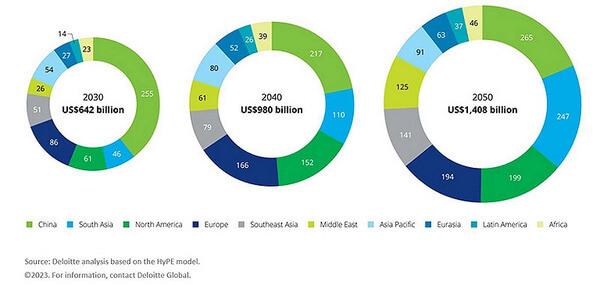New Deloitte report: Emerging green hydrogen market set to help reshape global energy map by end of decade, creating US$1.4 trillion market by 2050
As support for clean hydrogen as a reliable, sustainable energy source strengthens, the market is expected to top the value of the liquid natural gas trade by 2030 and grow further to US$1.4 trillion per year by 2050. Green hydrogen—produced by splitting hydrogen atoms from water molecules using electrical currents powered by renewable energy—is poised to help drive the bulk of the growth according to Deloitte’s new report “Green hydrogen: Energizing the path to net zero. Deloitte’s 2023 global green hydrogen outlook,” released today by the Deloitte Center for Sustainable Progress (DCSP). Global leaders can seize the opportunity presented by green hydrogen to rapidly decarbonize while investing in sustainable growth.
While market growth will likely be important for industrialized economies, clean hydrogen represents a major sustainable growth opportunity for developing countries, which, with targeted and significant investment, could account for nearly 70% of the US$1.4 trillion market in 2050 while supporting up to 2 million jobs globally per year between 2030 and 2050.
The projections come from Deloitte’s Hydrogen Pathway Explorer (HyPE) model, which delivers one of the most comprehensive analyses of the supply of hydrogen globally. This research shows that clean hydrogen can deliver up to 85 gigatons in reductions to cumulative CO2 emissions by 2050, more than twice global CO2 emissions in 2021. Deloitte’s outlook provides extensive detail into the cost, production, and market of hydrogen, even analyzing the business challenges facing the successful implementation of clean hydrogen, and providing insights into various market dynamics, such as optimal infrastructure sizing, investment needs, and technology choices.
“This analysis reveals a compelling opportunity for private and public leaders to accelerate the green energy transition,” said Joe Ucuzoglu, Deloitte Global CEO. “While wind, solar, and other more traditional forms of renewable power are essential to a net-zero future, Deloitte’s research demonstrates how clean hydrogen can help tackle decarbonization of some of the world’s most emissions intensive and hardest-to-abate sectors, further mitigating the effects of climate change while fueling economic growth, particularly in developing countries.”

Image: Deloitte
Interregional trade is key to helping unlock the full potential of the clean hydrogen market, supported by diversified transport infrastructure. Regions that are currently able to produce cost-competitive hydrogen in quantities that exceed domestic needs are already positioning themselves as future hydrogen exporters—supplying other less-competitive regions and helping to smoothly facilitate the energy transition. Notably, global hydrogen trade is projected to generate more than US$280 billion in annual export revenues by 2050, with North Africa expected to benefit the most (US$110 billion per year) due to its high export potential.
“If policymakers and business leaders provide decisive support of the market, green hydrogen can outcompete carbon-intensive hydrogen production in less than 10 years,” said Jennifer Steinmann, Deloitte Global Sustainability & Climate practice leader. “Reducing our carbon emissions and the physical and economic damages from unmitigated climate change is a massive win for nations and businesses alike. This represents a key pathway for the world’s developing countries to establish their energy security and independence, bolster economic growth as a result of the investment that will need to flow, and collectively firm up global growth and resilience.”
According to the report, major supply chain investment will be needed to help optimize the global value of clean hydrogen. The report estimates more than US$9 trillion of cumulative investments are required in the global clean hydrogen supply chain to help meet net-zero compliance by 2050, including US$3.1 trillion in developing economies.
“Money is not the problem—though the average annual investment over the time period is significantly less than the US$417 billion that was spent on oil and gas production in 2022 globally,” said Prof. Dr. Bernhard Lorentz, founding chair of the DCSP and Deloitte Global Consulting Sustainability & Climate Strategy leader. “It’s just a question of redirecting the investment to clean energy sources, and Deloitte sees that the global finance industry has an increasing appetite for major investments.”
To help achieve climate neutrality by the middle of the century, the Deloitte outlook shows clean hydrogen supply growing to approximately 600 MtH2eq in 2050. However, based on current clean hydrogen project announcements, the global community could only provide a collective production capacity to meet one quarter of the projected demand in 2030.
To help scale up a robust and fair clean hydrogen economy to meet projected demand, the report recommends policymakers focus attention on three key components:
- Lay the market foundation. Lay out national and regional strategies to lend credibility to the market, develop a robust and shared certification process for clean hydrogen to help ensure transparency, and coordinate internationally to help mitigate political friction and promote a level playing field
- Spur action. Establish clear targets and/or markets for clean hydrogen-based products and offer pointed instruments, such as fiscal incentives and subsidies, to help reduce the cost difference between clean and fossil-based technologies and help businesses integrate clean hydrogen into their value chains
- Ensure long-term resilience. Diversify value chains—from trade partners to raw material suppliers—to help prevent costly bottlenecks during the transition to clean hydrogen, focusing specifically on improving infrastructure design to more effectively transport (pipelines and marine roads) and store (strategic reserves) clean hydrogen commodities
The Deloitte Global Hydrogen Center of Excellence:
To help policymakers and business leaders plan and execute a future built on clean hydrogen, Deloitte has unveiled its Global Hydrogen Center of Excellence. The center is dedicated to supporting clients in scaling up clean hydrogen and driving large-scale decarbonization. Through practitioners at Deloitte firms, the center plans to work with clients across all stages of market development—from advising and sharing insights to help address some of the most complex questions, to implementing solutions and supporting the execution of projects on the ground, to helping enable operations, such as resilient supply chains and infrastructure.
“Scaling up Deloitte’s hydrogen-related offerings to organizations around the world through the Center of Excellence is our latest effort to further support clients during this crucial energy transition and reflects Deloitte’s investment in and commitment to sustainability and climate,” said Tarek Helmi, Deloitte Global hydrogen leader. “Deloitte’s research demonstrates the growth potential of the global hydrogen market—and Deloitte is committed to helping organizations transform their operations through a currently underutilized but effective resource.”
The Deloitte Hydrogen Investment Corridor:
Deloitte has launched a Hydrogen Investment Corridor initiative to help establish multilateral collaboration across key hydrogen trade and investment pathways, with an initial focus on Germany, Australia, Africa, and Japan. As a global platform, the corridor will convene specialists from the public sector, industry, and finance to help accelerate investment in clean hydrogen value chains and help enable the ramp-up of this emerging industry. Through the corridor initiative, Deloitte will support the development of public policy, including hydrogen strategies for public authorities; bring economic and technical modeling skills to help inform decision-making; and convene different entities along the value chain to help support consortia formation and scaled investment.
For more information and to view the full findings of Deloitte’s “Green hydrogen: Energizing the path to net zero” outlook report, visit: www.deloitte.com/global/en/issues/climate/green-hydrogen.html
- Source:
- Deloitte
- Author:
- Press Office
- Link:
- www.deloitte.com/...
- Keywords:
- Deloitte, hydrogen, market, global, 2050, jobs, growth, net zero, green, renewable energy























